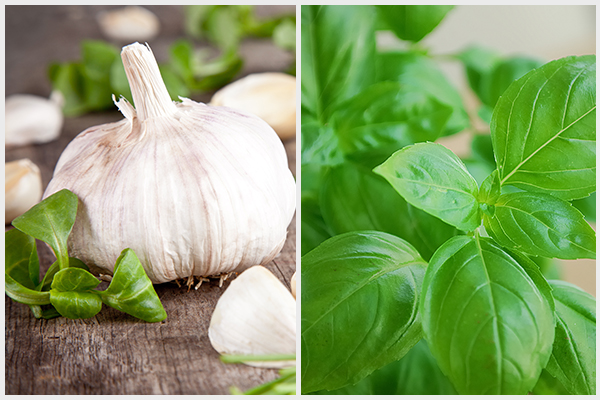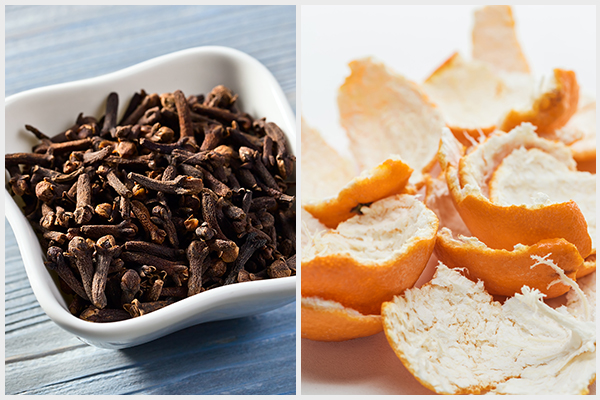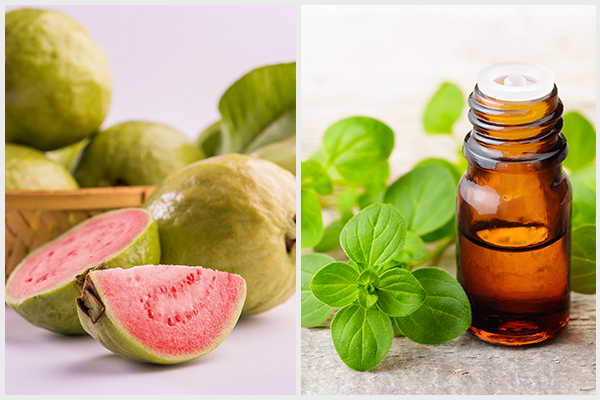In this article:
Typhoid fever, or simply typhoid, is a bacterial disease of the gastrointestinal tract and bloodstream. It is most generally caused by Salmonella typhi.

When the bacteria enter the body via polluted food, drinks, or water, they reproduce and circulate from the intestines into the bloodstream. The bacteria travel in the blood all the way to your liver, spleen, gallbladder, and other parts of the body.
Treatment for typhoid fever includes antibiotic therapy in addition to the usage of clean water, good hygiene, and sanitation.
Moreover, there are vaccines available to safeguard you from getting typhoid. However, the newer strains of S. typhi are becoming resistant to conventional antibiotic treatment. So, complications may arise. (1)
Fortunately, some home remedies may deliver comfort from typhoid symptoms and facilitate healing.
Home Remedies for Typhoid Fever
Here are some at-home remedies to relieve typhoid fever.
1. Try using garlic
Salmonella is a type of harmful bacteria that belongs to the Enterobacteriaceae family. It can cause different types of infections in humans, including typhoid fever.
A study was conducted to evaluate the use of garlic for typhoid treatment. In the study, garlic juice extraction was done after the removal of garlic coverings and washing them thoroughly with clean water. The garlic cloves were crushed, and the juice of the clove was extracted by filtering through a muslin sheet.
The Salmonella bacteria isolates were subjected to this garlic extract. It was observed that the extract inhibited the growth of enteric pathogens.
In the present time of rising antimicrobial resistance, alternative therapies such as the use of available herbs such as garlic extract can bring potential solutions to the table for fighting enteric pathogens such as Salmonella species. (2)
How to use garlic for typhoid fever:
- Eat 2 cloves of garlic on an empty stomach in the morning for a few weeks to help alleviate typhoid fever symptoms.
- To make garlic tea, peel and chop 3–4 cloves of fresh garlic and add them to a pot of boiling water. Let the cloves simmer for 5–10 minutes, strain the liquid, and add honey or lemon to taste. Drink this tea twice a day.

2. Drink basil tea
Basil (Ocimum basilicum) is available worldwide and is utilized in the food, pharmaceutical, and cosmetic industries. Sadly, the nutritious richness and functional aspects of basil seeds remain unknown.
Basil has been largely employed in traditional medicine systems for the treatment of headaches, coughs, constipation, diarrhea, and other issues.
Basil is known to offer a lot of pharmacological benefits since it acts as a:
- Stomachic
- Antioxidant
- Antiviral
- Antimicrobial
- Analgesic
- Anti-inflammatory
- Antipyretic diuretic
Research has also shared the antimicrobial action of basil seed oil against Gram-positive and Gram-negative bacteria including the typhoid-causing bacteria Salmonella spp. (3)
Basil was studied for its benefits against typhoid-induced fever, and the oil showed a good antipyretic (fever-reducing) property. (3)
How to use basil for typhoid fever:
- Add a few basil leaves and 1 tsp of ground ginger cloves to a cup of water.
- Boil this mixture, and you can add a little honey to taste.
- Drink this tea 2–3 times every day for a few weeks.
3. Sip on a cup of clove tea
Salmonella typhi is a pathogen that only affects humans and leads to 21 million cases of typhoid fever and around 200,000 deaths every year. The illness is endemic in many countries that aren’t very developed, particularly the following regions:
- Indian subcontinent
- Southeast Asia
- Africa
- Central America
Generally, an infection caused by Salmonella typhi is caused by the ingestion of infected food and water. Many antibiotics, including ampicillin, chloramphenicol, and fluoroquinolones, are useful in treating a Salmonella infection, but the bacteria have evolved to become resistant to first-line antibiotics in many countries.
Observations from studies plainly indicate that eugenol (the primary constituent of clove) has probable antibacterial activity against Salmonella typhi. Eugenol causes the disruption of the bacterial cell membrane that causes leakage of ions and other cellular contents, finally leading to bacterial death. (4)
How to use clove for typhoid fever?
- Add 5–7 clove buds to water.
- Boil this mixture.
- Allow it to cool.
- Strain and drink the tea in the morning before breakfast.
- Do this for at least a week.

4. Drink orange juice
Salmonella can live undiscovered in the gut of animals that people eat and thereby are transmitted to them. Thus, animal diets can affect populations of foodborne bacterial agents, including Salmonella spp.
Orange juice production in industries often generates some waste products such as orange peel and orange pulp, which have a high nutritious content and is commonly included in cattle diets. A study demonstrated that the inclusion of orange peel in animal diets reduced Salmonella populations.
Salmonella infection was substantially controlled by orange peel treatment throughout the gastrointestinal tract, and this demonstrates that orange peel and pellets are products that can be used for decreasing the spread of pathogens such as Salmonella, which causes typhoid fever. (5)
How to use oranges for typhoid fever?
Simply drink fresh orange juice every day to keep your body cool and help reduce typhoid symptoms.
5. Consume guava
Guava (Psidium guajava) is a therapeutic plant used in folk medicine because it is thought to contain active ingredients that assist in the treatment and management of numerous diseases.
A study was done to assess the antimicrobial action of essential oils and other compounds extracted from guava leaves such as methanol, hexane, and ethyl acetate. These compounds were analyzed for their usefulness against bacterial strains.
It is fascinating to report that these extracts were found to be effective against Salmonella, which causes typhoid and paratyphoid fevers. (6)
How to use guava for typhoid?
Either eat a guava every day or simply drink fresh guava juice for its benefits.

6. Use oregano essential oil
Typhoid fever remains a major public health issue, particularly in regions where there is inadequate sanitation and hygiene. The problem of multidrug resistance of Salmonella typhi, the bacteria accountable for causing typhoid, further problematizes the treatment and control of typhoid fever.
Many compounds have been determined from oregano oil in different proportions with major components being carvacrol, cymene, and 4-Terpineol. All these have been confirmed to have inhibitory action against gram-negative bacteria such as S. typhi. (7)
You can take oregano oil supplements after speaking with the doctor.
Additional Tips to Deal With Typhoid Fever
Healthcare professionals have shared the following tips for at-home management of typhoid:
- Finish the entire antibiotic course to ensure the bacteria are totally expelled from your body.
- Get adequate rest.
- Drink plenty of fluids.
- Eat regular and nutritious meals.
- Have smaller meals more frequently instead of three larger meals.
- Maintain good personal hygiene.
- Keep washing your hands with soap and warm water.
- Contact your doctor if your symptoms get worse.
Prevention Against Typhoid Fever
For the prevention of typhoid fever, experts and professionals have listed the following points:

- Drink clean and safe water.
- Maintain good personal hygiene.
- Make sure you eat safe food.
- Ensure proper sewage treatment in your area and house.
- Get the typhoid vaccination.
- Be cautious if you visit areas with a typhoid endemic.
Most-Asked Questions About Typhoid Fever
Can I get typhoid from my pets?
Typhoid fever affects only humans and is spread via the intake of contaminated food and drinks.
When is typhoid more common?
Professionals explain that enteric fever is seen more commonly during hot seasons when the concentration of bacteria in water bodies increases or in the rainy season when flooding can spread the sewage to drinking water sources.
What are the chances of death from typhoid?
Commonly, the mortality is low, which is less than 1% in places where antibiotics are easily available, but in poorer areas, mortality may rise to 10%–30%.
Can a typhoid fever relapse?
According to the Centers for Disease Control (CDC), a relapse can occur in around 10% of patients diagnosed with typhoid fever.
How does cold compression help in typhoid fever?
Cold compression is generally used to help lower body temperature and, therefore, may provide relief from typhoid fever discomfort.
What is a good diet for those suffering from typhoid?
Experts suggest avoiding spicy, greasy, or fried foods. Instead, eat soft food such as bananas and rice.
Final Word
Typhoid fever is a well-known bacterial infection of the gastrointestinal tract that you can contract upon drinking and eating contaminated food and water. It can cause various symptoms such as fever, headache, diarrhea, vomiting, and constipation, which can be alleviated to an extent using home remedies.
If you don’t feel any better, seek professional help immediately.
 Continue ReadingTyphoid Fever: Causes, Symptoms, Management, and More
Continue ReadingTyphoid Fever: Causes, Symptoms, Management, and More
- Was this article helpful?
- YES, THANKS!NOT REALLY


